Why Are Electrochromic Glasses Gaining Popularity in Automotive Smart Window Production?

20 May
2024
Highlights
- Introduction
- Role of electrochromic glasses in smart windows
- Rising usage of nanomaterials
- Recent acquisitions and product launches in the sector
The automotive sector has adopted smart glass technology to improve the safety and comfort of vehicles. These glasses play a vital role in designing automotive smart windows. Automotive smart windows are glass-based products that exhibit variable light transmission properties in response to applied voltage, heat, or light stimuli.
The global automotive smart window industry is estimated to display the fastest CAGR of 22.5% by 2032. The growth is attributed to high demand from the passenger car segment and a rise in demand for hybrid and electric vehicles. Moreover, smart windows are also effective in blocking ultraviolet light, which increases demand for the product and contributes to the overall growth of the landscape.
Manufacturers prioritizing electrochromic glasses for automotive smart window
Electrochromic smart glass is an advanced technology for automotive smart windows that controls the amount of light and heat entering a vehicle. Electrochromic technology works by using an electrical signal to adjust the tint of the glass that delivers control over glare and energy usage. When voltage is provided, ions traverse through a unique material between two glass layers by modifying the glass's light transmission characteristics. The glass maintains its adjusted state without requiring continuous electricity, resulting in energy savings.
Electrochromic smart glass assists in reducing the strain on the air conditioning system through dynamic control over the amount of heat and light entering the vehicle. This results in decreased energy consumption and prolonged battery life in EVs by contributing to the reduction of greenhouse gas emissions. The technology assists in shielding the vehicle's interior from UV damage and fading, thus preserving the quality of materials and prolonging their lifespan.
Nanomaterials are getting preferred as a key component
Nanotechnology has played a major role in advancing solar-responsive smart windows. Nanomaterials like nanoparticles and quantum dots can be integrated into window coatings to selectively reflect or absorb sunlight. This capability enables effective heat regulation, decreasing dependence on conventional heating, ventilation, and air conditioning (HVAC) systems. Smart windows, using solar-responsive nanomaterials, help save energy and promote environmental sustainability.
Exploring the alliances by frontrunners to lead the supremacy in the industry
The automotive smart window industry is highly competitive, and top entities are engaging in strategic alliances to dominate the sector. Leading automakers prioritize assessment of their target customers and delivering personalized experiences that meet their specific needs and preferences.
PPG Industries acquired Cetelon, a manufacturer of automotive coatings
In April 2021, Pittsburgh-based PPG Industries entered an agreement to acquire Cetelon Lackfabrik GmbH, a manufacturer specializing in coatings for automotive and light truck wheel applications. Cetelon is known for developing and producing a range of coating systems for the wheel industry, including those built on proprietary technologies.
The strategic purchase of Cetelon will enable PPG to enhance its current range of coatings products and its expertise in liquid and powder coating technologies and color matching abilities.
Lexus RZ has implemented Light-control Panoramic Roof of AGC featuring Low-E Coating in May 2022
AGC Inc., headquartered in Tokyo and a leading manufacturer of glass, chemicals, and high-tech materials, has created a light-control panoramic roof featuring Low-E coating. This innovation was added to the Lexus RZ, an exclusive Battery Electric Vehicle (BEV) model released by Toyota Motor Corporation. The panoramic roof provides an expansive cabin ambience and optimal temperature comfort by using Low-E glass with solar control and heat insulation abilities. Additionally, the removal of a sunshade contributes to the vehicle's overall weight reduction.
The latest Low-E coating technology of AGC for automotive glass has successfully passed the reliability assessment mandated by the prestigious LEXUS brand, known for its commitment to superior quality and latest features. Additionally, it has achieved remarkable solar control and heat insulation performance, resulting in reductions in summer heat and winter cold.
To conclude, the global automotive smart window industry is witnessing transformation due to high demand from the passenger car segment and a rise in demand for hybrid and electric vehicles. However, low prices of advanced materials will open new avenues for the landscape in the upcoming years.
To enter a new era of transformation in the sphere with well-informed decisions, contact our experts!

Koyel Ghosh
Author’s Bio- Koyel Ghosh is a blogger with a strong passion and enjoys writing in miscellaneous domains, as she believes it lets her explore a wide variety of niches. She has an innate interest in creativity and enjoys experimenting with different writing styles. A writer who never stops imagining, she has been serving the corporate industry for the last five years.
How Are Oil & Gas and Petrochemical Companies Helping the Explosion Proof Heater Industry Flourish in 2024?
Avenue: Entire Library membership of Allied Market Research Reports at your disposal
- Avenue is an innovative subscription-based online report database.
- Avail an online access to the entire library of syndicated reports on more than 2,000 niche industries and company profiles on more than 12,000 firms across 11 domains.
- A cost-effective model tailored for entrepreneurs, investors, and students & researchers at universities.
- Request customizations, suggest new reports, and avail analyst support as per your requirements.
- Get an access to the library of reports at any time from any device and anywhere.
Related Post
-
How are Submarine Cables Transforming Global Connectivity with Enhanced User Experience?
-
Endoscopy Procedures: Transformations in Techniques and Applications
-
AI-Powered Video Analytics: How the Product Actually Works for enterprises
-
Painting Robots: Transforming Precision Coating and Creative Applications
-
Innovations in Pharmacovigilance Systems Advancing Patient Safety
-
Understanding Edge Security: Keeping Data Safe Near the Source
-
Exploring the Use and Advancements of 3D Laser Scanners in Professional Applications
-
Reinforcing Industrial Controls with Smarter Tools and Training








